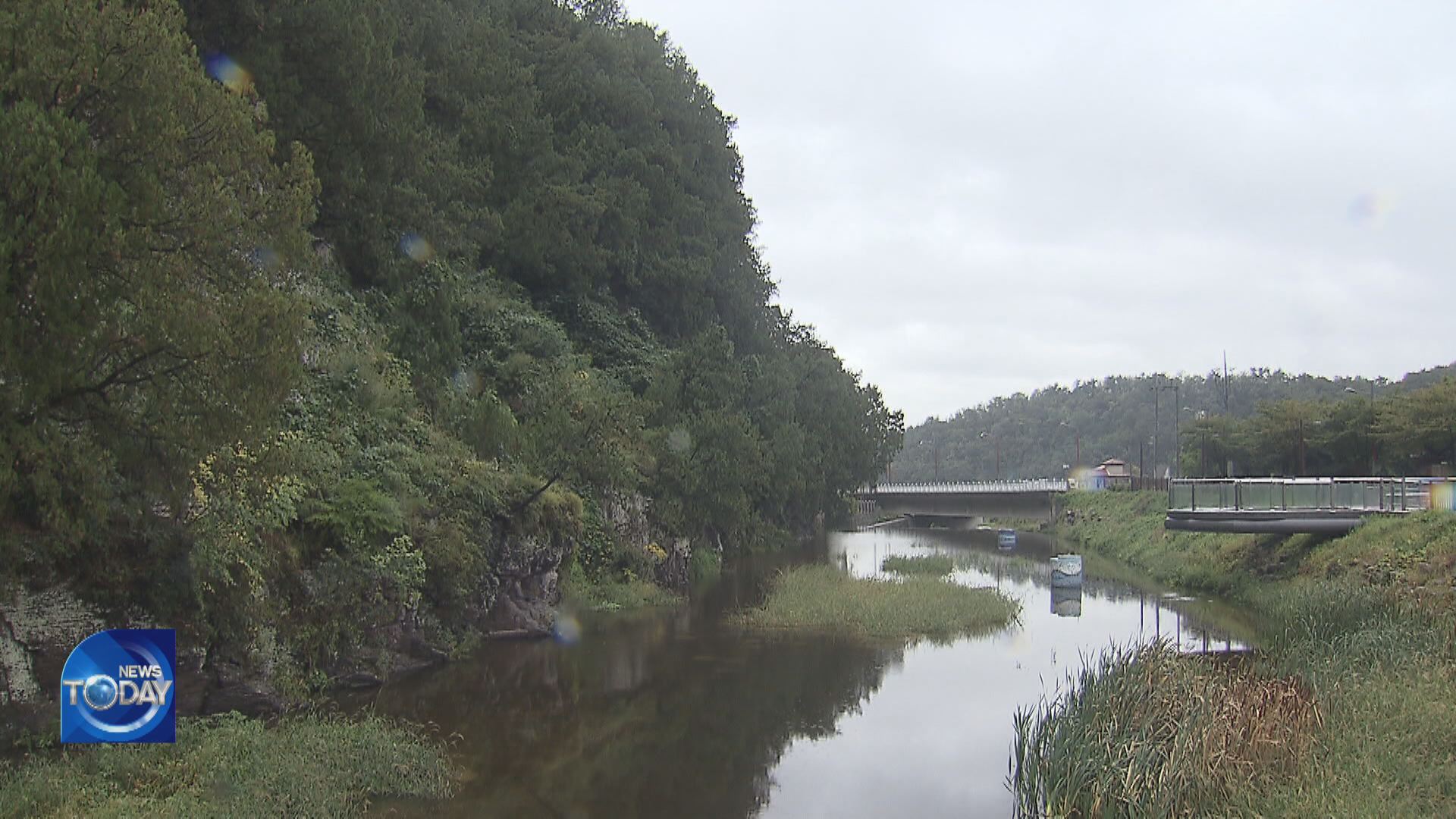VINES AND SCRUBS DAMAGE FOREST
입력 2022.10.05 (15:04)
수정 2022.10.05 (16:46)
읽어주기 기능은 크롬기반의
브라우저에서만 사용하실 수 있습니다.
[Anchor Lead]
A colony of thuja trees in the city of Daegu is designated as the country's natural monument No. 1. Hundreds of trees growing on a southernmost cliff represent invaluable scientific value. But in recent days, thickets of vines and scrubs are posing a serious threat to the forest. Take a look.
[Pkg]
Some 700 thuja trees form a colony on a precipitous cliff wall. The Dodong thuja forest in Daegu was designated by the government as the country's very first natural monument in 1962. However a closer look reveals the poor condition of the woods as leaves have turned brown and dried up. Five trees have already withered away. Vines and scrubs have been wrapping around the trees, stifling their growth and the recent drought has made things worse.
[Soundbite] Seo Gwan-gyo(Daegu Resident) : "As a local resident, I‘m so embarrassed when visitors come and ask about the natural monument."
Thuja trees are known to grow only in China and so their presence in Korea's southernmost region measuring some 35-thousand square meters of habitat holds incredible value in botanical terms. Access to the forest is restricted for preservation reasons and only those with permission from the Cultural Heritage Administration can enter the premises as it has tremendous ecological value. There were some 11-hundred thuja trees in the early 2000s. But that number has dwindled to around 700. Rival species such as ivies and broad-leaved trees must be removed frequently but that work is carried out only once a year. This is due to a tight annual budget of 25 million won which is not enough to cover labor and equipment costs required for the dangerous task of removing weeds and scrubs from a rocky cliff.
[Soundbite] (Daegu Dong-gu dist. official (VOICE MODIFIED)) : "It’s true the budget is tight. Talks are underway with the Cultural Heritage Administration to get more funding so the removal work can be done quarterly."
Support is urgently needed to better preserve and improve the habitat for the precious natural heritage site that is losing its original shape.
A colony of thuja trees in the city of Daegu is designated as the country's natural monument No. 1. Hundreds of trees growing on a southernmost cliff represent invaluable scientific value. But in recent days, thickets of vines and scrubs are posing a serious threat to the forest. Take a look.
[Pkg]
Some 700 thuja trees form a colony on a precipitous cliff wall. The Dodong thuja forest in Daegu was designated by the government as the country's very first natural monument in 1962. However a closer look reveals the poor condition of the woods as leaves have turned brown and dried up. Five trees have already withered away. Vines and scrubs have been wrapping around the trees, stifling their growth and the recent drought has made things worse.
[Soundbite] Seo Gwan-gyo(Daegu Resident) : "As a local resident, I‘m so embarrassed when visitors come and ask about the natural monument."
Thuja trees are known to grow only in China and so their presence in Korea's southernmost region measuring some 35-thousand square meters of habitat holds incredible value in botanical terms. Access to the forest is restricted for preservation reasons and only those with permission from the Cultural Heritage Administration can enter the premises as it has tremendous ecological value. There were some 11-hundred thuja trees in the early 2000s. But that number has dwindled to around 700. Rival species such as ivies and broad-leaved trees must be removed frequently but that work is carried out only once a year. This is due to a tight annual budget of 25 million won which is not enough to cover labor and equipment costs required for the dangerous task of removing weeds and scrubs from a rocky cliff.
[Soundbite] (Daegu Dong-gu dist. official (VOICE MODIFIED)) : "It’s true the budget is tight. Talks are underway with the Cultural Heritage Administration to get more funding so the removal work can be done quarterly."
Support is urgently needed to better preserve and improve the habitat for the precious natural heritage site that is losing its original shape.
■ 제보하기
▷ 카카오톡 : 'KBS제보' 검색, 채널 추가
▷ 전화 : 02-781-1234, 4444
▷ 이메일 : kbs1234@kbs.co.kr
▷ 유튜브, 네이버, 카카오에서도 KBS뉴스를 구독해주세요!
- VINES AND SCRUBS DAMAGE FOREST
-
- 입력 2022-10-05 15:04:32
- 수정2022-10-05 16:46:01

[Anchor Lead]
A colony of thuja trees in the city of Daegu is designated as the country's natural monument No. 1. Hundreds of trees growing on a southernmost cliff represent invaluable scientific value. But in recent days, thickets of vines and scrubs are posing a serious threat to the forest. Take a look.
[Pkg]
Some 700 thuja trees form a colony on a precipitous cliff wall. The Dodong thuja forest in Daegu was designated by the government as the country's very first natural monument in 1962. However a closer look reveals the poor condition of the woods as leaves have turned brown and dried up. Five trees have already withered away. Vines and scrubs have been wrapping around the trees, stifling their growth and the recent drought has made things worse.
[Soundbite] Seo Gwan-gyo(Daegu Resident) : "As a local resident, I‘m so embarrassed when visitors come and ask about the natural monument."
Thuja trees are known to grow only in China and so their presence in Korea's southernmost region measuring some 35-thousand square meters of habitat holds incredible value in botanical terms. Access to the forest is restricted for preservation reasons and only those with permission from the Cultural Heritage Administration can enter the premises as it has tremendous ecological value. There were some 11-hundred thuja trees in the early 2000s. But that number has dwindled to around 700. Rival species such as ivies and broad-leaved trees must be removed frequently but that work is carried out only once a year. This is due to a tight annual budget of 25 million won which is not enough to cover labor and equipment costs required for the dangerous task of removing weeds and scrubs from a rocky cliff.
[Soundbite] (Daegu Dong-gu dist. official (VOICE MODIFIED)) : "It’s true the budget is tight. Talks are underway with the Cultural Heritage Administration to get more funding so the removal work can be done quarterly."
Support is urgently needed to better preserve and improve the habitat for the precious natural heritage site that is losing its original shape.
A colony of thuja trees in the city of Daegu is designated as the country's natural monument No. 1. Hundreds of trees growing on a southernmost cliff represent invaluable scientific value. But in recent days, thickets of vines and scrubs are posing a serious threat to the forest. Take a look.
[Pkg]
Some 700 thuja trees form a colony on a precipitous cliff wall. The Dodong thuja forest in Daegu was designated by the government as the country's very first natural monument in 1962. However a closer look reveals the poor condition of the woods as leaves have turned brown and dried up. Five trees have already withered away. Vines and scrubs have been wrapping around the trees, stifling their growth and the recent drought has made things worse.
[Soundbite] Seo Gwan-gyo(Daegu Resident) : "As a local resident, I‘m so embarrassed when visitors come and ask about the natural monument."
Thuja trees are known to grow only in China and so their presence in Korea's southernmost region measuring some 35-thousand square meters of habitat holds incredible value in botanical terms. Access to the forest is restricted for preservation reasons and only those with permission from the Cultural Heritage Administration can enter the premises as it has tremendous ecological value. There were some 11-hundred thuja trees in the early 2000s. But that number has dwindled to around 700. Rival species such as ivies and broad-leaved trees must be removed frequently but that work is carried out only once a year. This is due to a tight annual budget of 25 million won which is not enough to cover labor and equipment costs required for the dangerous task of removing weeds and scrubs from a rocky cliff.
[Soundbite] (Daegu Dong-gu dist. official (VOICE MODIFIED)) : "It’s true the budget is tight. Talks are underway with the Cultural Heritage Administration to get more funding so the removal work can be done quarterly."
Support is urgently needed to better preserve and improve the habitat for the precious natural heritage site that is losing its original shape.
이 기사가 좋으셨다면
-
좋아요
0
-
응원해요
0
-
후속 원해요
0












![[속보] 내란 특검, 한덕수 전 국무총리·안덕근 산업통상자원부 장관 소환](/data/layer/904/2025/07/20250702_dLOmfA.jpg)
![[속보] 국민의힘 혁신위원장에 안철수 의원…“당 개혁 최적임자”](/data/layer/904/2025/07/20250702_Y70u81.jpg)



이 기사에 대한 의견을 남겨주세요.